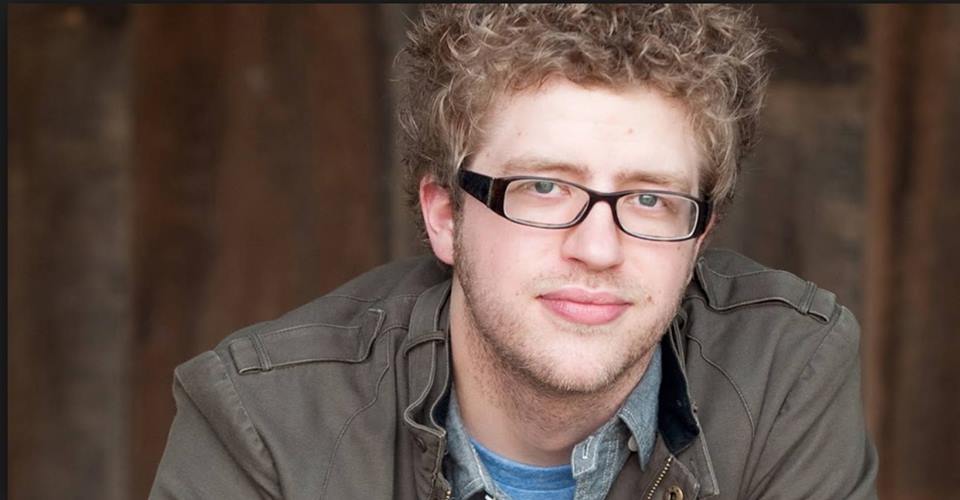When Dave Lucas became Ohio’s second-ever Poet Laureate on Jan. 1, 2018, he approached the position with a mission. Despite his impressive academic background–B.A. from John Carroll University, MFA from the University of Virginia, and MA and PhD from the University of Michigan, Ann Arbor–Lucas firmly believes poetry belongs outside the classroom as a staple of everyday life. A self-proclaimed “evangelist” for both poetry and his hometown, Cleveland, Lucas actively utilizes his platform to make people aware of the poetic world in which they live.
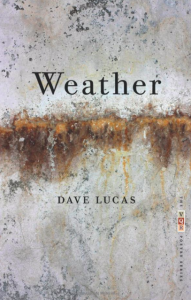 Lucas himself draws heavily from his surroundings, especially those of his upbringing. His first book, Weather (Georgia, 2011), a recipient of the 2012 Ohioana Book Award for Poetry, focuses on the city of Cleveland and how it shaped Lucas’s development as both a writer and an individual. Lucas calls himself more of a “winter poet” than a “spring poet”–common themes of his include the interplay and conflict of industry and nature, religious ritual and myth, and decay in the physical, spiritual, and seasonal sense.
Lucas himself draws heavily from his surroundings, especially those of his upbringing. His first book, Weather (Georgia, 2011), a recipient of the 2012 Ohioana Book Award for Poetry, focuses on the city of Cleveland and how it shaped Lucas’s development as both a writer and an individual. Lucas calls himself more of a “winter poet” than a “spring poet”–common themes of his include the interplay and conflict of industry and nature, religious ritual and myth, and decay in the physical, spiritual, and seasonal sense.
Lucas’s work functions as a sort of anti-defamation league for the Midwest, shaking off shameful feelings Rust Belt natives endure from those who have never seen the sun set over Lake Erie. Defiant poems like “River on Fire” take an environmental disasters like the Cuyahoga River Fire of 1969 and utilize “linguistic bombast” that “could be in the King James Bible” to reclaim the act as a supernatural triumph for Cleveland. Like the titular river, Cleveland “burned and was not consumed” by declines in industry. Lucas writes to celebrate the lands that raised him, and through his efforts readers can do the same. Oh rejoice, ye residents of Steubenville, Wheeling, Buffalo, Youngstown! Here is an artist who’s just not shedding light on you, but is one of you. Poems like “Suburban Pastoral” take a romantic, yearning tone, playing with the frailty of memory and serving as a microcosm for any forgotten, beloved Midwestern corner, while “Midwestern Cities” celebrates the morning commutes of Midwesterners from Chicago to Pittsburgh to Kenosha.
Lucas isn’t only a loyal advocate of the Midwest, but of poetry itself. His column “Poetry for People Who Hate Poetry” (inspired by a course he teaches at Case Western Reserve University) explores the poetic acts of daily life—how can anyone truly hate poetry when they love singing along to their favorite song in the car, every word perfectly memorized?
As a professor at a STEM school, Lucas’s MO is giving everyone the opportunity to appreciate the humanities. He tailors his class to address topics like the poetics of algebra and the structural component of writing, showing the coexistence of poetry and science. Lucas also takes poetry into his beloved city, partnering with and supporting small businesses in the process. In 2012, he co-founded the Brews and Prose reading series at Market Garden Brewery with the belief that “listening to great writing while sipping great beer could make both experiences better.” Now in its sixth year, the series “has grown to showcase America’s great authors to Cleveland and to showcase Cleveland to America’s great authors” the first Tuesday of every month at 7 p.m.
OWL editors and Ohio natives Karina Primmer ’21 and A.L. Davies ’19 sat down with Lucas to discuss his identity as a Midwestern writer, his focus on the “small moment made large,” the modern value of poetry, and, of course, his favorite beer.
In a 2016 award citation, you said, “[The Cleveland Arts Prize is] a great honor, especially because I think of myself so much as a poet from Cleveland and the first book [Weather] is so thoroughly about this city.” How has growing up in the Midwest inspired your writing? How did leaving the Midwest for graduate school affect you?
 If a writer is one that writes about a place, one of the things that seems to focus them most intently on that place is leaving it. All of the sudden, the aspects that are obvious to the point of mundane when you’re there every day are suddenly noticed again. I had the sense that I wanted to write about where I was from, and I was figuring out how to do it. But part of figuring out how to do it was leaving. Longing is a great thing to write out of.
If a writer is one that writes about a place, one of the things that seems to focus them most intently on that place is leaving it. All of the sudden, the aspects that are obvious to the point of mundane when you’re there every day are suddenly noticed again. I had the sense that I wanted to write about where I was from, and I was figuring out how to do it. But part of figuring out how to do it was leaving. Longing is a great thing to write out of.
In terms of thinking of myself as a Midwestern writer, it was certainly important for my book Weather, in part because I loved Seamus Heaney’s book Death of a Naturalist. The way he writes about his “plot of Earth” inspired me. What’s specific to the Midwest and Cleveland for me is that people were getting it wrong. As a result, I developed a sort of indignation about what the narrative of Cleveland was, and found myself wanting to address that tonally in the poems. It supplied me with a tone I could use. Because I’m interested in linguistic bombast, that also became a way of adapting language that sounds like it could be in the King James Bible.
In class, we’ve read “Suburban Pastoral” and “At the Cuyahoga Flats,” both celebrations of seemingly ordinary scenes from Midwestern life. How do you go about the “small moment made large” in your work? Where does the impulse towards the ordinary come from? What makes a “good” subject?
I don’t necessarily think there’s such a thing as a good or bad subject. I think it’s all in the treatment. If you were my publisher, and I pitched you, “Well, this novel’s just about a day in Dublin,” you’d say, “Wow, that sounds terrible. I don’t wanna publish that.” But if it’s Ulysses, then it’s amazing.
I think that appreciating the ordinary comes from somebody else showing you how to. Other writers made ordinary moments extraordinary. Good poetry often takes something familiar and makes it unfamiliar, or does the opposite–takes something that seems completely foreign and brings it home in a way that is deeply satisfying.
I’m a firm believer in poetry that’s grounded in the sensory world. I don’t respond well to abstractions; I never did well with reading philosophy. But I can deal with philosophical ideas if they’re presented in a metaphorical way. For me, the images that work best are visceral in a way both familiar and unfamiliar at once. There was a line somewhere, maybe from the chef Ferran Adria, about eating a tomato and the amazing act of eating the heart–the taste of it, how there’s nothing like it. Or, Seamus Heaney describes eating an oyster by saying, “My palate hung with starlight.” That’s the paradox of metaphor–it makes suddenly extraordinary this thing you’ve done a thousand times or more.
Those are very striking metaphors, but in an interview with cleveland.com you also note that metaphor and poetry “pervade everything we do.” Where in everyday life do you most often see metaphor, and how does that relate to teaching poetry?
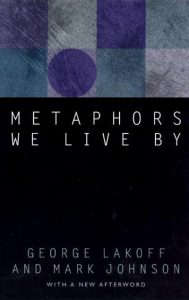 The way that we talk about our lives is almost always metaphor–in order to understand our lives, we make them into narratives.
The way that we talk about our lives is almost always metaphor–in order to understand our lives, we make them into narratives.
In my class “Poetry for People Who Hate Poetry,” we read Metaphors We Live By by George Lakoff and Mark Johnson. This book is like a good poem or stand-up comedy. When you hear what they’re saying, you go, “Oh yeah, of course.” Alexander Pope said what makes a good poem is “What oft was thought but ne’er so well expressed.” This book is like that idea that’s in your mind, and you can never find the words to express it, until someone else says it and you’re like, “Oh yes, exactly!”
In it, they talk about spatial metaphors like “The future is in front of us.” But there are some cultures where it’s opposite: the future is behind you, and the past is in front of you because you can see it. You move backwards into the future you cannot see. When I think about that spatial metaphor, my mind starts to boggle a bit. The metaphor of the future being before us is so ingrained in our minds that it doesn’t even seem like a metaphor, it seems like a fact. But it’s a specific way of framing our experience with the world.
Or the idea that “I want to be the top of my profession.” How did the top become good and the bottom become bad? We also have sayings like “I invested so much time in that,” or “I wasted so much time.” “How do you spend your time?” Even the verb we use has to do with monetary and financial transactions.
I think people have been made to feel intimidated by poems as objects they’re supposed to read, analyze, decipher, and often, people will say, find the hidden or deeper meaning. I think the best way of opening people up to poetry is to talk about the ways poetry itself is part of everyday life–specifically the way we make sense of our lives through language.
If you say something like “Well, I don’t know what’s going to happen, that’s a ways down the road,” you’re already using the poetic gesture of metaphor to understand your life. When somebody says “I can’t stand poetry,” you just used a poetic gesture to say that. And the more that we’re open to that, the more open we can be to poems in the traditional sense. Poetry is part of the fabric we speak in.
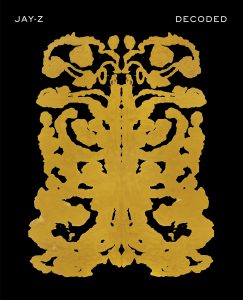 What other texts do you teach to convince students of poetry’s value?
What other texts do you teach to convince students of poetry’s value?
We look at Jay-Z’s book Decoded as a way of thinking about the deliberately poetic elements of hip-hop. Because I teach at Case Western University, and it’s a very big STEM school, I want to aim this course specifically for the pre-engineering and pre-health majors.
We also read a book by G.H. Hardy called A Mathematician’s Apology. I first read this book by Hardy in a course that was the inverse of mine, called “Math in Creativity.” I had always believed I did not understand mathematics. It opened me up to the idea that math wasn’t about finding the right answer, it was about finding the most elegant answer. The idea that mathematics is about beauty, too, made me feel more open to it than I had before. A poem is often demonstrating metaphoric equation between two things. That’s what algebra’s doing all the time, and looking for the most eloquent way of expressing it.
It’s interesting that you connect metaphor and math, because in a 2016 award citation, you describe poetry as “a consolation for me that wasn’t available through religious, scientific, or philosophical truth. Metaphorical truth through poetry became the way I could make sense of the world.” Could you elaborate on this?
The poetry that interests me most is concerned with ultimate questions. My particular lens for those questions is the Catholicism I grew up in. Although I’ve struggled with the question of belief, the matter of ritual became very important. I think that’s why I like metered poems so much. There’s something very ritualistic about that style. It’s probably a mix of Catholicism and OCD (laughs).
Poetry has become my way of asking questions of belief, which I don’t think I have satisfying, logical answers for. The best answers for them, I’ve found, are metaphorical: “We are fish and God is the sea.” I like that metaphor. I don’t know if I believe it, but I like it. I don’t understand God, but nobody does. If we put it this way, maybe we can get a little better at understanding Him. I’m interested in poetry that pushes the quality of language towards the quality of prayer as well, language that has an almost sacred purpose.
How does this sense of the sacredness of language impact your poetry stylistically and thematically?
Stylistically, I’ll borrow a line from one of my teachers, Charles Wright, who says that “poetry tends to put tension between the written word and the spoken word.” So, for instance, poets like William Carlos Williams keep the language in their poems as close to speech as it can possibly be. And others, Hart Crane for instance, push as far away from ordinary speech as they can. I’m more in that latter camp–I’m interested in poetry as language that has memorable grandeur to it. Poetry is something almost incantatory; the idea that if you say the right word, something can happen.
Thematically, I think some poets are spring poets, some are summer poets, and some are autumn or winter. I think I’m an autumn or winter poet. I’m more interested in the beautiful dying than the doomed beginning. I think my themes change, though, because the themes of our lives change, too. I keep coming back to myth quite often, because I think the older I get, the more I’m finding in myths that I didn’t have access to before. My friend tells this great story about a time he went to a used bookshop. He’d already read The Catcher in the Rye and owns it, but he found a copy of it at this used bookshop and felt compelled to buy it. There’s this old bearded guy at the counter, the kind of guy you expect to find at a used bookshop, and he takes one look at the book and says, “This book has changed since you last read it.” I just think that’s the coolest story! The things we need from stories change, and yet, a lot of it is already there.
Take something like Hamlet. I’d read the play and admired its poetry. But it changed for me after my father died. A writer friend of mine lost her mom within a month of when my father died, and we would email about the grief process. We were both reading Hamlet at the time, and we found the depiction of Hamlet’s grief was so spot-on. We’d read it earlier in an academic, intellectual way. But now, it was visceral; now, it was real. That sort of thing comes through when Hamlet asks, “To be or not to be? That is the question.” It’s all these academic questions that are now coming through in a real, lived way.
I need to write that down. I’m gonna use that some day.
We had a visiting poetry professor and OWU alumna last year, Maggie Smith, who said during a lecture that her most recent poetry collection (published in 2017) featured a poem she’d started during her senior year in 1998 that had never found a home in any of her other collections. Walk us through the collection process with the creation of your poetry books. How do you organize your poems into a collection? What makes a group of poems a collection? How do you revise a poem and truly know when a poem is done?
Some writers tend to think in terms of stories or novels; some poets tend to think in poems, series, or in projects. I do tend to think in terms of projects, in part because a theme or style or something like that will get under my skin, and it takes a while to really work it out. The projects end up conforming to whatever a particular thought or moment is. For instance, when I travel by myself, I’ll want to write about a place. Often those poems are so based in landscape that they’re their own thing–they don’t belong with these “mythy” poems that I’ve been writing. They do some of the same things that [Weather] might do, but they’re their own creation. I don’t have a manuscript for those yet, but I sock ‘em away in a file. Maybe one day I will have traveled enough and written enough to do something with them.
I think the poems sort of announce themselves as they come into my mind. Of course, part of that is because I’ve been thinking about this or that topic. Again, I think they begin out of necessity and then necessity started to conform them to whatever patterns they fall into. I do feel like I’ve done enough with myth for now, but then I find stuff that makes me think I haven’t or I find things that fit in a way, or poems apply that I didn’t think applied necessarily.
As for when a particular poem is done, the best way for me to discover that a poem needs to be revised more is to see it in print when someone else has decided to publish it. Nothing clarifies my own writing like seeing it in print or reading it out loud and thinking “Oh God, this needs to be…” There are times where I find myself reading a poem to an audience and then think “Oh I should change this, I should change that.”
On the other hand, I think after a certain amount of time that a poem is in the world already–and Paula Deen says this somewhere–that I really don’t have any more right to change it than you would to go and change it. I mean, none of us feel like we should be welcome to go into an art museum and start touching things up, but if Monet wandered in, would he be allowed to do that to his own paintings? I don’t know that he should, but there are stories that he did. I think that once a work has become public in some way it changes, and that can be just bringing something into workshop and seeing what happens. They’re never finished, they’re only finished enough.
You operate in multiple genres as a writer. Karina and I read your essay “That Father Lost” in Professor Butcher’s Writing Essays workshop, and we’ve read your poetry for this Literary Editing course. How do you decide what genre you’ll work in with a new piece? Why did “That Father Lost” become an essay and not a series of poems?
In the case of that essay, it started off as just notes on my own grief. I tend not to write poems that are autobiographical in an obvious way to a reader–some of the poems I have that feel the most autobiographical to me would not read that way to somebody else. I tend not to like when my poems are overtly autobiographical, but there are times when I’m trying to figure out something that has happened, or that I’ve done, or that I’ve thought. That needs to be on the page, too. And those tend to be essays of some kind or another.
“That Father Lost” was written out of a time when I was writing from a need to express and think things through, and because it was a notebook full of these little moments, they ended up connecting eventually. Once I had a sense of what the form was, I started thinking to fit it.
I think forms develop out of necessity, but then they begin to dictate based on their own habit. Someone had to invent the iambic pentameter and had a reason they needed it. It’s survived 800 years, in part because it fits a moment, but also because once you’ve got a pattern in mind, you tend to follow it.
I think, also, in a poem, the language needs to be on display more than it does in an essay. Essays allow more space to think. Now, if you’re Shakespeare, you can think really beautifully in the course of a soliloquy. I am not Shakespeare.
When we write, Professor Butcher often has us imagine we’re writing to a “room of writers” whose style we admire, and who we’d want to enjoy our work. Who would be in your “room of writers?”
I think my room of writers has to have my teachers in it, all the way from Ellen Geisler, my 12th grade AP Literature teacher, to now. The people who I spent time with in classrooms, in terms of writers, are the ones I aim most to please. I think we write for our various dead, too. They’re not necessarily writers, but we write for the people we’ve lost in one way or another. I do, anyways.
Do you feel like you need to change your projected audience now that you’re Ohio’s Poet Laureate?
My poems have not changed, not necessarily. I think, as a teacher or as someone who talks about poetry a lot, being named Poet Laureate is an opportunity to have a larger audience for things I’m already interested in. I like having English majors in my classes a lot, I like people who have the same assumptions as I do about the value of poetry, but there’s also a real pleasure in talking with somebody who is interested but doesn’t necessarily have their own way in, or see that the door is open already. That is a different kind of pleasure, and it’s one that I think is really important. Poetry can often be so insular and elliptical a form, I think it’s important poets do that poetry outreach. Even if the work is sometimes obscure, we need not be obscure as people.
Speaking of outreach: We read about your Brews and Prose reading series at Market Garden Brewery in Cleveland. So, for our most important question: What’s your favorite beer?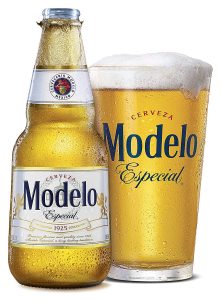
I like a pilsner in the summer, or a porter in the winter.
When I was in college and graduate school, I had very snobby beer taste. Now, I like Modelo Especial. That with a lime is pretty much all I need.
Final question: What is the value of poetry presently? How does the current social climate affect what you’re doing? Or does it affect what you’re doing?
Why, is something going on? (laughs)
Poetry is a commitment to the long game. We are certainly living through terrifying times, and those times are more terrifying for people in the margins than for somebody who’s lucky enough to be where I am, through no work of theirs or mine. But the work of poetry, to me, seems to be a way to make sense of a world that’s making less and less sense on its own terms every day. Even if the poem isn’t a protest poem, the act of writing a poem and the act of reading a poem is still a protest against the forces of chaos and, I’d go so far to say, the forces of injustice, too. I think a poem, even if it’s not addressing political themes, is still a gesture attempting to make a world better than the one we live in.
I don’t think they have to name names, either. I think all poetry is political because everything is political, it’s unavoidable. But I don’t think the art has to be topical to stake political ground. There’s great work being done that is very specific to individual moments. That’s not the sort of work that I do, not because I think it’s less than, but I’d rather see what the story of Marsyas can tell us about the current moment than “name a political party” and go from there. In part because, unfortunately, injustice has not changed. It’s not gone away, anyways, and doesn’t seem to be going anywhere anytime soon.
So maybe that’s another thing poetry does–it teaches us to live, in spite of all of the elements of destructiveness.
Boy, that sounds grand now that I’ve said it, but maybe I’ll stick by it.

